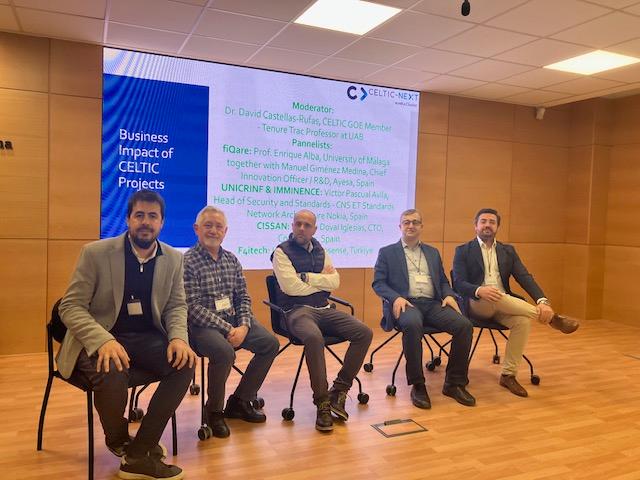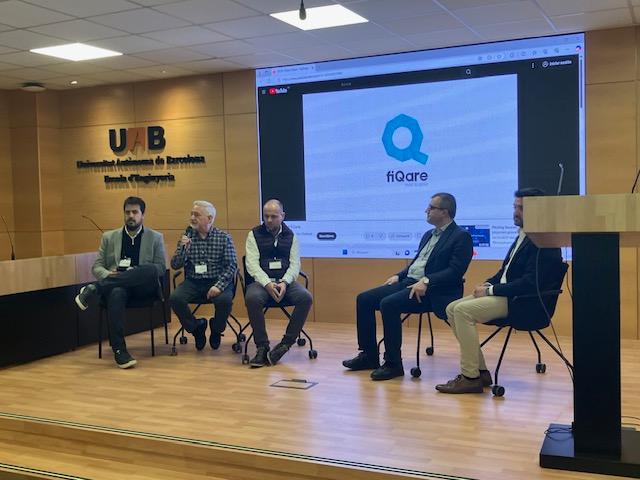February 28, 2025
Ayesa presents the fiQare project as a success story at CELTIC+ in Barcelona

The objective of this initiative, developed by a consortium, is to create an intelligent certification system for cloud and IoT security.
Ayesa has been responsible for researching and evaluating the quality of the FIWARE software, the most secure and reliable platform thanks to fiQare.
The fiQare project, developed by a consortium in which Ayesa participates, has been selected by the CTDI of the Ministry of Science and Innovation to be presented as a success story at the CELTIC Business Impact Session held on February 24 in Barcelona.
The objective of fiQare was to develop and implement an innovative methodology based on artificial intelligence to improve the security, reliability and quality of software in IoT environments.
More than five years ago, before the rise of LLMs, fiQare was already at the forefront of AI-powered automation for software quality, and demonstrated that automation was key to improving productivity in software development. This approach evolved into DEVAID, a platform that optimizes Software Factory efficiency, ensuring faster, higher quality and more cost-effective development.

Manuel Giménez, Chief Innovation Strategy Officer at Ayesa, presented this development to industry leaders, qualified experts, and funding agencies from around the world, who attended the annual CELTIC meeting to explore the latest advances, challenges, and opportunities in the ICT sector. This specialized forum addressed topics related to trustworthy AI and cybersecurity in 5G and 6G networks.
A leading example in this context is the fiQare project, developed by a consortium of companies led by the NEO group of the University of Málaga (UMA), with the participation of Ayesa, Secmotic, and TIGA. Its objective is to create an intelligent certification system for cloud and IoT (Internet of Things) security, which will improve the quality of the FIWARE software platform, making it more secure and reliable. This platform, promoted by the European ICT industry and the European Commission, provides tools and forms an innovation ecosystem for entrepreneurs to create new applications and services on the internet.
In fiQare, Ayesa has been responsible for researching and evaluating the quality of the FIWARE software, using the ISO/IEC 25010:2011 standard. Meanwhile, UMA developed an artificial intelligence capable of automatically analyzing the software. The university institution also focused on detecting the quality improvements required in the source code.

Technical Objectives
Finally, fiQare proposes the design, creation, and execution of an innovative methodology, through the study and application of eight key aspects of the ISO 25010 standard applied to FIWARE GEs. These are as follows:
- Functionality: The expected functionalities will be defined, and the implementation will be checked to see if it fulfills its purpose.
- Efficiency: The performance of the GEs will be analyzed, including their source code, considering response time, memory usage, battery consumption (on portable devices), storage needs, and network usage. This will help define scalability, adaptability, and real-time capability, among other features.
- Compatibility: The extent to which the components (GEs) can exchange information with other components and interconnect using their APIs will be analyzed.
- Usability: Using intelligent quantitative techniques, the main features of the FIWARE platform related to quality, patterns, scoring rules, and usage guidelines will be analyzed.
- Reliability: The aim is to increase trust in the software and reduce the probability of failures. To this end, various types of tests will be conducted to evaluate the composition and interaction capacity of the different web services (APIs), which are at the core of FIWARE. This parameter is crucial for the project. • Security: The level of protection for information and data will be measured to ensure that only those with sufficient authorization levels can access certain content.
- Maintainability: An analysis of the available source code for a series of GEs will be carried out to detect duplicated code, code smells, and commented code, thus preventing significant errors.
- Portability: This involves analyzing functionalities and efficiency across different operating systems, taking into account the current system restrictions.
We support your projects
We are here for you, to advise you personally and offer you the product you need.
